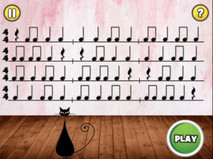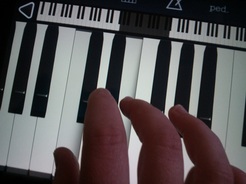 Rhythm Cat (©LMuse Ltd) Rhythm Cat (©LMuse Ltd) With that reference to Inspector Gadget, I suspect I'm dating myself a little! I grew up in a (not that long ago, honest) age, unimaginable to some of the youngsters I teach, without iPads, iPods, YouTube or Facebook. All my school – and music theory – work was done on paper. If I wanted to hear a piece of music, I had to buy a recording, listen out for it on the radio or go to a concert. Downloading music was a very new thing! This isn’t a post about the ‘good old days’ though. Technology is a hot topic with music teachers, with articles in magazines about the latest software, apps and gadgets to help with teaching. I’m generally a fan of technology so I've investigated quite a few of these, and adopted some for use in my lessons. I use quite a few internet resources for sheet music and theory (see my links section for info on some of these), but today I'm concentrating on my favourite apps - mainly iPad but some of these are available for Android and other systems too. Rhythm Cat (http://melodycats.com/rhythm-cat/) Rhythm Cat was one of the first musical apps I downloaded, drawn in by the name! It's a game which gradually builds rhythm skills, teaching how note values match up to sounds. There's a great, really varied soundtrack to play along to, and some beautifully-designed cat-related graphics. AuralBook (http://www.auralbook.com/gb/ad/abrsm/en/pc.php) There are a few apps for testing and improving aural skills - those skills of clapping in time, echo singing, sight-singing etc, which build general musicianship and are part of the ABRSM exams. ABRSM themselves offer the Aural Trainer, which is pretty good. AuralBook has a couple of advantages over this though - for one thing it's free, the full version for all eight grades. It also doesn't just play exercises or record your responses - it does both of these, and analyses your responses! So it plays you a melody, you sing it back, it records your singing and compares it to the original. Same with your clapping to see if it's in time. The one offputting aspect is the tone of voice of the 'examiner' who asks the questions and tells you how you've done - it's quite abrupt and doesn't pull any punches when it comes to saying you've made a mistake. Even the "wow" when you get something perfectly right sounds a bit sarcastic. But I've found if I warn students about this in advance, we end up having a giggle about it - one asks me if I've "brought the rude woman this week"! ScaleHelper (http://www.scalehelper.co.uk/) Another app that 'listens' to you! This one tests your scales and arpeggios - again, recording them and comparing them against how they should sound, checking notes, tuning, speed and rhythm. You can work on a particular scale, or ask it to 'challenge' you which prompts you with scales picked randomly from the appropriate syllabus. You get a mark and a really detailed note-by-note analysis, plus a big cheer if you do well! I've found this one really motivating for some students, being driven on to get a better mark. The big downside to this one is the price - there's a free version but that's quite limited. The full app is £4.99 and then there are further costs to download exam syllabuses (sets of scales for each grade). I also like ScaleBox - although this doesn't 'mark' the scales for you, it encourages self-assessment which is a really useful skill to develop.  Alongside these apps, I make use of a metronome (lots of free ones available), a piano app which gives you a small playable keyboard on the screen (handy for theory - explaining intervals etc), and a recording app - again really helpful for encouraging students to listen to and self-assess their own playing. My favourite is Voice Record Pro which is free but has lots of useful features, including the ability to upload and share recordings online - handy if students want to keep a copy of their recording. Not all teachers are fans of apps and gadgets – I’ve heard them dismissed as gimmicks, a waste of time, or only used as a ‘treat’. I use them as part of a range of materials, and I do think you need to take as much care testing them out and assessing them as you do with any teaching materials, tutor books etc (so yes, I have sat at home and gone through all eight grades on AuralBook, and all the levels on Rhythm Cat)! Just as there are books I choose not to use as a teacher, there are apps that I’ve decided were badly designed, pointless, or just confusing to use. I make sure the ones I use actually teach students something, but I also want them to be intuitive to use and fun too. Part two of this post - coming soon - will look at more 'physical' gadgets, including the "helicopter thingy" that my youngest pupils are very keen on!
2 Comments
Nicola Reilly
24/3/2015 02:23:28 pm
I can't really imagine a music teacher of youngsters not using apps etc. these days..... 'Gadgets' like smart boards etc are so common place in schools kids are expecting all 'mod cons'. Homework is downloaded from the school websites etc - feeling very old just typing that sentence !
Reply
Your comment will be posted after it is approved.
Leave a Reply. |
Keep in touch
I have an email newsletter where I share my latest blog posts, news from the flute and wider musical world, my current projects, and things I've found that I think are interesting and useful and would love to share with you. Expect lots about music and education, plus the occasional dip into research, language, freelance life, gardening and other nice things. Sign up below! Archives
July 2019
Categories
All
|
 RSS Feed
RSS Feed
